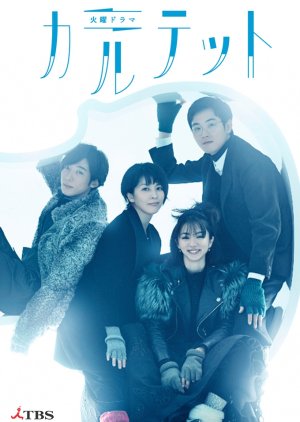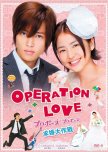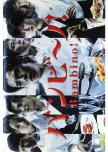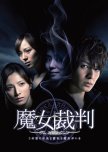
I came into this drama for the cast alone, but I got much more than I was expecting. If you are expecting a great romance, you may be disappointed. There are some romantic feelings, but it is not the main point. The quartet of flawed but likable individuals find friendship and support at a time when they all have a deep need for it. As a hardcore romantic, I thoroughly enjoyed the friendship and didn't feel any lack due to the barely there romance.
The best things about this drama:
1) the acting- the casting could not have been more perfect. Each actor seemed fitted to the role, bringing out the best in their character.
2) the characters- perfectly imperfect, and quirky. Their interactions with each other made each episode special.
3) the witty banter- I applaud the writer. So very clever. This truly made the drama a joy to watch.
4) the music- brilliant!
Quartet may not be everyone's cup of tea, but for me, this is the best drama of the year.
Was this review helpful to you?

Story : This drama is mainly about four third rate musicians friendship, group struggles and their individual stories with a little bit of romance in it.
The romance here is very weird . It forms a near cycle missing one link. you will understand when you watch the drama. as far as J dramas go Quartet is a very good drama with slice of life vibes in it. The cinematography is good with snow covered locations. The 4 lead's acting is very good.
Pros :
- Good story
- Good acting
- Music is very good
- end Title song
- Light comedy
As far as cons go, the romance here is little weird and unsuccesful. Not much to say as this isn't a drama which you pull your hair out for, but a very feel good drama you watch on a slow day.
This drama is worth a 8.5 / 10.
Was this review helpful to you?

"Adults keep secrets".
'Quartet' is a truly fantastic series that plays out in a similar manner to a well-composed musical composition. There are conflicting motifs of trust versus betrayal, truths versus lies and dreams versus reality, spun together with friendship, secrets and unrequited love.The four protagonists are excellently characterised. As with their instruments, they each shine individually, during one-on-one conversations and when they're all together. It was great how over the series, you don't stop learning about their pasts, their families and friends and the secrets they hold within them. The charisma of each character and the allure of their rapport are in no small part to the amazing performances and chemistry of the exceptional actors and actresses; Matsu Takako, Matsuda Ryuhei, Takahashi Issei, Mitsushima Hikari are four legends I won't forget. Seriously, the acting is some of the best I've seen in a J-drama so far, and they have to be applauded for making an effort to look as if they are actually playing their instruments. The dialogue is masterfully produced. Aside from being witty and feeling very natural, seemingly small remarks and humorous situations often take on overarching significance that tie into the themes of the series. Clever metaphors, symbolisms and double meanings are also planted generously through each episode, making one feel rewarded for paying attention to them. There are enough excellent quotes to fill up a small notebook.
The locations used were well chosen, endowing an intelligently written series with aesthetic value as well. The town of Karuizawa was beautiful, especially in winter, and the villa and restaurant had a cozy, homely feel to them. While there could've been more variety, I love the selection of classical pieces, especially the quartet arrangement of Smetana's "The Moldau". The BGMs are pleasant but the ending song, along with the lavish music video, are absolutely incredible. The food looked nice too. A nice bonus was seeing Kankuro Kudo act (which he is also good at).
'Quartet' doesn't limit itself to a singular mood. Sometimes it wants you to laugh out loud. Sometimes it wants you to feel awkward and slightly creeped out. Sometimes it wants to move you to quiet anger, and sometimes it just wants to make you feel warm inside. For me at least, it got me every single time.
Was this review helpful to you?

Sebuki Suzume was my favorite, she was pure(?) a kind of overlooked personality, she hides her feelings and she feels weak but she also never backed down from her feelings and personal beliefs and with that her friendship with Maki Maki was my favorite.
Iemori Yutaka was another weird personality I loved, he seemed easy going and quirky but he also had his own struggles, though I don't think they were able to show the depth.
Beppu Tsukasa was the leader, and Maki Maki was the glue and overall the four of them had a beautiful connection~
I also really loved the ending ost and I was kinda disappointed it wasn't a solid part of the story ;(
Kisugi Arisu was a really weird random personality, tbh she was a comic relief but also a "wth" kind of existence xD and with that I think the writers lacked in making anything real and deep beside the friendship.
most of the other side characters felt weird. I especially wasn't really happy with ep6-7, plus the whole backstory for any of the characters, it felt rushed, not fully thought out and shallow(?)
I was also not really happy with the hints of romance though thankfully it was not the focus.
but I loved the ending and overall it was like a sweet warm hug that really touched my heart~
Was this review helpful to you?

Quirky, surreal, warm and friendly
There is a somewhat bizarre plot which meanders along picking up themes as it goes. We go through digressions into crime, music, friendship, blackmail, betrayal, unrequited love, abuse, possible murder etc, all embedded in a wintry slice-of-life, set two hours drive out of Tokyo. It gathers all the themes together, along with a seemingly random selection of self diagnosed failures as characters (with the obligatory oddball viola player - musician’s joke…), but like strangers at a party, they don’t quite mesh. There is a slightly surreal feel that I am coming to associate with Japanese dramas and it has a strange affinity with Sartre’s play, “No Exit” (Hell is other people) where each of the characters wants something from the others which the others can’t or won’t give them. However, this is not a story about Hell, but about acceptance, both at a personal and an interpersonal level.It doesn’t really follow a single plot line, but presents sequences of fragmented scenarios that have a thread running through them. Just when you think it’s all fallen apart, it comes back together at the end.
There are some really good performances from the core cast who hook you in and carry you through. The “playing” of the instruments is a bit unconvincingly painful to watch at times, but that’s a constant gripe in many shows that involve musicians and the actors do a good enough job if you don’t look too closely.
A bit like a meal of leftovers, it’s all hashed together, but tastes good! I was in two minds about how to rate it, but in the end enjoyed it enough to bump it up from ordinary to good.
Note the Easter egg squirrel in the final episode, just before the credits :-)
Was this review helpful to you?

This review may contain spoilers
Only Japan can make a drama like this
Only Japan can make a drama like this. They are best at bringing the most realistic aspects of human life that a lot of people can relate to, at least it's for me, and they do it so naturally. "Quartet" has a similar vibe with one of my other favorite Japanese series “Life’s Punchline”, which is also a great slice of life drama, with a little bit of mystery elements.I relate to every character and their story. The series has brought to life the real people, without any filter. They are the people we can meet in our real life, with all their strengths and flaws. Four main characters are a group of oddballs with different personalities. Together, they form a found family under the name of a quartet. I really love their bonding. It is just so beautiful. Their daily interactions with a lot of bantering are the light of the whole series.
What I love the most about "Quartet" is its concept of a found family. As someone who grew up in a dysfunctional family, I always find comfort in the concept of a happy family or found family, and I got sick of the typical trope where 'family is family and we should stick together no matter what'. In this series, there are no toxic family members that we have to meet if we don't want to, just because they are blood-related family members and everyone says you should meet or take care of them. This message is directly implied in the conversation between Maki and Suzume at a restaurant near the hospital where Suzume's biological father is. People around Suzume kept telling her to visit her shameless father, while Maki just told Suzume to go home with her after knowing that Suzume didn't want to do that. She also said that the members of the quartet are family because they share the same house, use the same shampoo and wash their clothes in the same washing machine. How beautiful that is!
I think that one of the reasons why the members of the quartet meet each other and form a new found family together is that they all have problematic families, besides being weirdos. Maki and Suzume were also the ones who ran away from their biological families to start a new life. All of them are each other's home. They are the imperfect pieces in an imperfect found family, yet no pieces should be missed out. Just like how a doughnut can't be a doughnut without a hole, Quartet Doughnuts Hole can't exist without the flaws from its members. Their first meeting at the karaoke is really a destiny.
Another thing I love about this drama is that there is no romantic couple between the main characters in the end. Although it's painful to watch their unrequited love fail, I think it's very realistic. It happens in real life. Not everyone can be with the person they love.
I love that music and food are included in this slice of life series. It adds a lot to the story. I enjoyed every piece of music played by the quartet. I love how imperfect it is, as well as how imperfect and weird our characters are. I relate to them a lot, as I'm a weirdo myself and also someone who chose to stop chasing a dream as an artist and kept it as a hobby instead, with a quite similar reason. In my case, I grew up in an Asian household and was forced to study hard in academic stuff. I love painting but haven't had any proper art class. I don't learn any techniques professionally, and I think my paintings are not something people would want to buy. I also realized my love for art quite late and was stuck with regrets for a while, when I wanted to become an artist but also thought I couldn't live on my art skills. I didn't really want to learn properly either, as I love the way I paint. When I decided to keep it as a hobby, my heart became more relieved. I also met a friend with a similar situation, and we often meet and talk about arts and life. I will call her my quartet sister from now on. :)
At the moment I am still trying to figure out what I really want to do and what I can do well. I'm kind of in a career crisis, and I'm not at the position I really want to be. I haven't found my ikigai. I feel I've been stuck in a comfort zone for too long. I want to start over again, and there are a lot of things I want to try. Other people say I'm not that young to keep experiencing things, but I'm not okay with being stuck like this anymore. My quartet sister says I can do it. She also has things she wants to try. I think we will be fine. I think we might do some workshops together in the future.
Was this review helpful to you?

This review may contain spoilers
AWESOME!!! This drama not only talk about music (but I really love the music scenes), but they talk a lot too about the friendship which feels like family. They support each other when the troubles come. The conflicts outside the quartet are not too deep also not too shallow. The settlement somehow didn't feel like a settlement for me, maybe because it's go so smooth so I didn't realize that the problems are solved.My first thought after I read the synopsis is that somehow I will find any suspense theme in this dorama. My other first guess is that the three of them hired by Maki Maki’s mother-in-law to make friends and observes her. Refer to the synopsis, not only Beppu, but every member in the quartet have a secret either from their past or their present. At first, I think I can say a lot about this drama, but then I realize that I can't told the beauty of this drama with words. So maybe it's better for you all to watch and feel the warmth of this drama.
Two of my favorite actor/actress are here and I'm really pleased. Takahashi Issey is really funny in here! He had a lot of lines and he nailed it to say it with such a speed (⁀ᗢ⁀) The other casts played great too, but for me the outstanding acting goes to Takahashi Issey and Mitsushima Hikari.
Music :
I really love the ending song of this drama because it's the song sung by the four of them : Otonano Okite - Doughnuts Hole
Was this review helpful to you?

This review may contain spoilers
The Joy of Doing What You Love!
If you are not doing what you love to do, then by the time your life is winding down, you may look back with regrets because of how much time was wasted. Kobe Bryant put this to his listeners once during a conference. He said, “If you aren’t doing what you love, then why are you doing it?” I think very few people in the world do what they love because of so many factors: money (usually assuming a lack of it), what people will think (family, friends, society), or even because you don’t believe in yourself enough to take the chance. Let me point out something about people like Bruce Lee, Kobe Bryant, and others. They never rested on talent alone. They put in the work so that they could be the best that they could be. And, yes, that is what it takes.Quartet is a lovely story of four misfits. I call them “misfits” because they feel that they are outsiders who don’t seem to fit in anywhere. However, they all share one passion: the love for music. Three violinists and one cello player find themselves at a karaoke bar—seemingly by happenstance, but I think by the end of the series, we realize that it wasn’t an accident. One person sharing a joy is one thing, but it gains even greater power when four people combine their passion and talents.
Beppu is the leader of the group. He not only has a talent for the violin, but he’s someone how knows how to get things done. However, he doesn’t rule with an iron fist—unless it’s about taking out the garbage! He has no problem listening to the others and gaining their thoughts and feelings about something. His family owns the villa in the countryside where the four choose to live together and perform nightly at a local restaurant. The venue may seem small, and perhaps insignificant to some, but that’s not the point. They’re doing what they love.
Maki is the heart and soul of the group. A woman with a mysterious past. First, we’re left to wonder what happened to her husband, as her mother-in-law recruits Suzume to find out, as she believes Maki has killed him. We also find out that not is all as it seems with Maki, and will her dark past find its way into harming the group?
Iemori is easily the funniest member of the group with his quirky logic when it comes to identifying and discussing seemingly insignificant things. He’s always a source for a laugh, but make no mistake, he’s got a big heart. He’s almost childlike and in a good way.
Last, but certainly not least, we have our cellist in Suzume. A lonely young woman who loves playing her cello on the streets for whatever money she can get. She also wears her heart on her sleeve. It’s pretty clear early on that she truly loves the other members of the group, especially Maki. Perhaps this is the only true family Suzume has ever had. And when she begins to shed tears, it’s hard to hold back ourselves. She’s a little clumsy and has the propensity to sleep anywhere! Under the coffee table, slumped over chair, it really doesn’t matter. She will also do whatever she can to protect and help the other members of the group. We find out, very quickly, that she is not at all comfortable spying on Maki for Maki’s mother-in-law.
The group’s four members are endearing as they get to know each other throughout the series. Only one of them has a real job when the series begins. The other three are either unemployed or are about to leave their respective jobs. Of course, they begin to question the rationale of simply being a quartet. Even friends and family find it difficult to understand the logic of essentially doing something for very little. Toward the end of the series, it’s Suzume who answers this question when she talks about seeing the smiles on people’s faces or those rare moments when they get some feedback about how happy the listener is because of their music.
We also see the sad lives of those who are not living their passion and dreams. Arisu is a petty, vile young woman who works at the restaurant where the quartet performs. All she cares about is getting out there and finding a way to make a quick buck or perhaps find someone wealthy to take care of her. At one point, she schemes to steal Maki’s violin when she finds out how much it’s worth. She’s extremely self-centered, doesn’t care about anyone else, and it’s easy to see why she’s such a miserable woman. Even she finally finds her rich husband at the end, we also know two things: it will never last, and that type of happiness is always fleeting.
We also find a letter in the last episode from a musician who clearly didn’t make it as one. The person unloads their own frustrations and unhappiness at the group, unable to understand why they continue to play when they don’t play well. Of course, anyone who listens to this group can see that they play just fine. They may not be on par with some of the elite, but they can play! And the point is that they never gave up. They don’t let anyone or anything discourage them from doing what they love. This is showcased beautifully in the last episode when a can is thrown at them as they perform on stage, and many of the listeners get up and leave in the middle of the performance. However, what is truly magical is that none of these things prevents the quartet from continuing to play with smiles on their faces for the few who’ve remained behind.
In the end, if you are doing what you love to do, you don’t care if you’re doing it in front of a thousand people, a few people, or even none at all. You’re doing it for yourself, which is the most important thing. You don’t care if it brings you millions of dollars, a few dollars, or none at all. The joy of doing it is its own reward. And that is the beautiful message of this lovely series!
Was this review helpful to you?

A Sonata of Flaws, Forgiveness, and Found Family
Some stories announce themselves loudly from the very first note. Quartet is not that kind of story.It opens like a hesitant pluck of string on a barely tuned violin—shy, awkward, slow. For the first episode or two, you might find yourself wondering whether you’ve wandered into an avant-garde meditation on adult disappointment. But then, like all the best compositions, Quartet finds its tempo. And when it does, it plays a symphony that is bittersweet, whimsical, aching, and profoundly human.
Set against the frosted silence of a Karuizawa winter, Quartet introduces us to four individuals who each carry a secret like a cello case on their back—heavy, awkward, impossible to ignore. They meet by fate, or perhaps by narrative trickery, and decide to form a string quartet named, of all things, “Doughnut Hole.” The reason? “Because only people with holes in their hearts can create music like this.” That absurdly poignant metaphor is the beating heart of the entire show.
Let’s get this out of the way: Quartet boasts one of the finest ensemble casts I’ve seen in a J-drama. And it’s not just about individual performances—it’s about how they breathe in sync, like musicians sharing one breath across four instruments.
Mitsushima Hikari as Suzume is absolutely mesmerizing. If emotion had a stealth mode, she’s cracked it. Her portrayal of the free-spirited, sleepy, yet emotionally wounded cellist is so layered it’s like peeling an onion while blindfolded—every revelation stings a little, and yet you can’t stop. She brings to life a woman who smiles while her heart crumbles, and somehow, it never feels contrived. Just devastatingly real. Suzume, the sleepy-eyed cellist with a murky past and the soul of a wounded animal, is one of the most layered characters I've seen in a long time. Her ability to mask sadness with whimsy, to cry while smiling, to offer joy while breaking inside—Hikari performs every emotional beat with a terrifying precision that’s impossible to look away from.
Takako Matsu as Maki Maki (yes, really) is equally brilliant in her restraint. Maki is a character wrapped in silk and secrets, a woman who speaks in polite half-truths and musical metaphors, and Matsu delivers her story with the grace of a tightrope walker—careful, deliberate, breathtaking when she finally leaps. The drama wisely waits to unpack Maki’s backstory until the perfect moment, and when it lands, it does so with a narrative weight that hits like a dropped bow on a silent stage. Giving us a character who seems composed on the outside but harbors storms inside. Her backstory unfolds like a tightly sealed letter, opened only when the drama is good and ready—and when it lands, it lands hard.
Issei Takahashi and Ryuhei Matsuda round out the quartet as Beppu and Iemori, each bringing a distinct texture to the ensemble. Beppu is the closest thing this drama has to a romantic lead, though he is so emotionally flammable that romance feels less like a spark and more like a fire hazard. Iemori, on the other hand, is the oddball viola player who speaks in riddles and seems to orbit reality at his own tilt. His interactions with Suzume—chaotic, tender, sometimes absurd—are some of the most charming moments in the show.
What truly elevates Quartet isn’t just the acting—it’s the writing. This is one of those rare dramas where the banter is a highlight. From seemingly pointless debates about whether to squeeze lemon on karaage, to metaphysical musings on love, truth, and identity, every conversation feels like a carefully composed jazz riff: casual on the surface, precise underneath. The humor is deadpan and odd, the emotional reveals are sudden but earned, and the story dances constantly between past and present without warning. It asks for your full attention, but it rewards you for listening.
The dialogue leans heavily on Japanese wordplay and cultural references, which might fly over the heads of non-Japanese speakers. But if you’re fluent or even semi-fluent, it’s a treasure trove of clever puns and emotionally resonant lines that walk the tightrope between comedy and tragedy.
The soundtrack, too, deserves special mention. Not only do the cast members perform the quartet pieces themselves (with some studio magic and a lot of practice), but the original theme song—sung by the actors—is an addictive, jazzy bossa nova earworm that manages to be upbeat and melancholy. Kind of like the show itself.
At a glance, Quartet might seem like your average slice-of-life story. Four strangers. One villa. A musical dream. But under the cozy kotatsu of that premise lies a surprisingly twisty web of deception, longing, and past regrets. But Quartet isn’t really about music. It’s about the people who make it. It’s about what happens when four flawed, lonely, misfit adults accidentally find each other and, without fixing their broken pieces, learn how to play together anyway. The love angles are messy—beautifully so. Suzume loves Beppu, who only sees her as a sister. Beppu pines for Maki, who is still unraveling from a marriage that almost destroyed her. Iemori, ever the pragmatic oddball, quietly protects Suzume from emotional pain, knowing he’ll never be the one she looks at that way. And despite all this emotional entanglement, the show never devolves into melodrama. It just lets the awkwardness, the longing, the unspoken words simmer quietly, as they do in real life.
It’s hard to talk about the plot without spoiling the little moments that make it special. Let’s just say this: every character is hiding something, but this isn’t a mystery show in the traditional sense. The secrets unravel slowly, organically, sometimes out of order, and often without warning. Flashbacks are slipped in with no announcement. Conversations hint at timelines that aren’t immediately clear. You’ll need to listen—not just to the music, but to what’s being said between the silences.
Yes, some resolutions feel rushed. And yes, the plot can get convoluted. But if you surrender to the rhythm, the emotional payoff is worth the patience. There are flaws, of course. The show starts slow—some might abandon it before it finds its rhythm. The plot sometimes spirals into convoluted timelines and subtle cues that could confuse an inattentive viewer. And certain resolutions to conflicts might feel too brisk or unresolved. But the emotional payoff is rich. Quartet is not about tying everything neatly—it's about learning to live with the knots.
If I had to pick one reason to recommend Quartet, it’s Suzume. Her arc is the emotional backbone of the series. She’s the trickster, the wildcard, the dreamer with the saddest eyes. Watching her struggle with unrequited love, personal guilt, and the fear of being abandoned again is like watching someone play a concerto on broken strings—and somehow still create beauty.
Another favorite thread was the quiet understanding between Iemori and Suzume. Their friendship, full of strange conversations and unspoken affection, is the kind of dynamic you rarely see onscreen. And while they don’t end up together, the mutual respect and care in their interactions was deeply touching. The show ends not with grand resolutions but with acceptance. The quartet performs to a full audience not because they’ve fixed their lives, but because they’ve decided to keep playing anyway
Verdict:
Quartet is a rare gem that doesn’t shout for your attention—it whispers, and if you’re willing to lean in close enough, it will sing to you about longing, forgiveness, and the quiet, imperfect beauty of being known. A slow start, yes, and sometimes too subtle for its own good, but what a profoundly satisfying little sonata it turned out to be.
Quartet asks: what happens when broken people come together not to fix each other, but simply to listen? What kind of music can be made from lives with gaping holes at their center?
The answer: something unexpectedly beautiful.
Yes, the pacing stumbles early on. Yes, it demands attention and cultural fluency. But once the pieces fall into place, Quartet becomes a delicate, emotional masterpiece—a found-family tale that lingers long after the final bow.
This is not a drama about solving mysteries or winning love. It’s a story about acceptance. About knowing someone might never heal completely, and choosing to stay anyway. In a world obsessed with perfection, Quartet dares to say: you don’t need to be whole to make harmony. Sometimes, all you need is someone to play alongside you.
Score: 8/10
Was this review helpful to you?
Multi-layered Story about Friendship, Loyalty & Trust
This is the second J-Drama that I've seen centring on classical musicians that I found to be just adorable!What I loved:
- the complicated plot that unravels slowly with lots of surprises
- the acting by all the ensemble cast
- the soundtrack- the modern adaptations of classical music - wish they had it on Spotify
- the developing friendships between the characters
- building on the themes of trust and loyalty
What was iffy:
- almost no chemistry between the characters who were romantically attracted to one another
- would have been better if it were 11-12 episodes long
- needed more development to the character development of Suzume, Iemori and Beppu.
- as is, it leaves the impression that this was not a story about an ensemble of characters, but one that centred on Maki as the solo lead character instead.
Was this review helpful to you?

Un drama lleno de música y humanidad.
Estaba en conflicto conmigo misma en cómo calificar este drama, porque es casi un drama perfecto, empezando desde el cast, que tienen una química increíble que se refleja inclusive cada vez que tocaban sus instrumentos en un centro comercial, en la calle o en un escenario.¿Qué decir del OST? Sencillamente es el corazón del drama entero. Lo que más disfruté del drama son todos esos momentos musicales.
El guión es sólido, cada episodio contiene frases muy buenas y muy memorables.
Entonces, ¿por qué no un 10? Es sencillo, la primera mitad del drama me pareció muy disfrutable y equilibrada, en todos los aspectos, incluída la historia, pero en la 2da parte siento que el escritor se enfocó mucho en cierto personaje que tenía tintes Mary Sue, es decir, en cierto punto parecía "Ella y sus otros tres amigos" cuando se supone que son 4 los personajes principales. Cosas que con el resto resolvía en un capítulo, con el personaje "Mary Sue" se tardó casi 3 capítulos en contar todo, sacrificando escenas o historia de los demás, de cierta forma, eso me aburrió y molestó un poco.
De cualquier forma, este drama no deja de ser increíble, casi una joya para mí, amé esa originalidad de pensar en una historia de 4 músicos fracasados con sus personalidades imperfectas en busca de hacer realidad su sueño como cuarteto.
Was this review helpful to you?








































